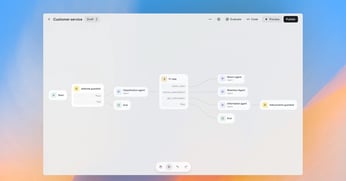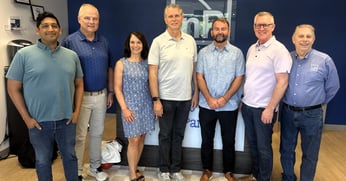At SF Tech Week, CloudFactory's Ajai Sharma revealed why humans are the backbone of AI, sharing 3 lessons on the future of data labeling.
CloudFactory Blog

Discover proven AI development strategies that drive enterprise success. Learn governance, data quality, and human-in-the-loop approaches plus insights.

Transform energy reporting with AI. Learn how to break free from data silos, reduce costs, and drive strategic value. Read our guide to consolidation.

Transform energy reporting with AI. Learn how to break free from data silos, reduce costs, and drive strategic value. Read our guide to consolidation.

Learn how the AWS outage impacts AI and discover strategies for resilience, including multi-cloud and human-in-the-loop solutions. Build resilient AI.

Discover the four harsh realities enterprises face when using OpenAI's AgentKit, from talent gaps to hidden costs. A guide for technical leaders.

Enterprise AI adoption jumped from 6% to 30%, but compliance lags behind. Learn strategic frameworks to navigate 2025 AI regulations successfully.

Discover optimization debt in AI—hidden risks from efficiency tradeoffs. Learn to manage it for robust, fair, and compliant AI systems with best practices.

Learn why edge case handling is critical for scaling enterprise AI successfully. Discover proven strategies and solutions for building resilient AI systems that handle real-world ...

Discover how AI agent integrations transform IoT and physical systems for enterprises. Learn best practices for scalable, governed AI deployments that drive real business value.

CloudFactory’s visit to nonPareil shows how service, empathy, and inclusion spark leadership and connection in the future of work.

See how AI transformed patent analysis for a leading AgTech company, turning months of manual work into minutes while uncovering strategic opportunities.

Discover how Generative Engine Optimization (GEO) transforms AI strategies for enterprises. Essential insights on scalability, governance, and ROI optimization.

Discover 15 innovative multimodal AI use cases that transform enterprise operations—from smart customer support to predictive maintenance. Drive efficiency now.

Discover AI accuracy scores' impact on enterprise AI with CloudFactory’s expertise in AI accuracy and compliance.

Explore 6 hard truths behind why 95% of AI pilots fail and uncover strategies to ensure your AI projects succeed.
.png?width=1563&height=1563&name=Untitled%20design%20(38).png)




.png?width=1563&height=1563&name=Untitled%20design%20(30).png)



.png?width=1563&height=1563&name=Untitled%20design%20(33).png)


.png?width=1563&height=1563&name=Untitled%20design%20(34).png)







